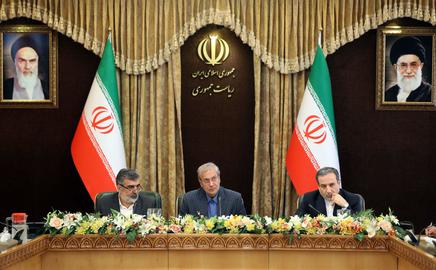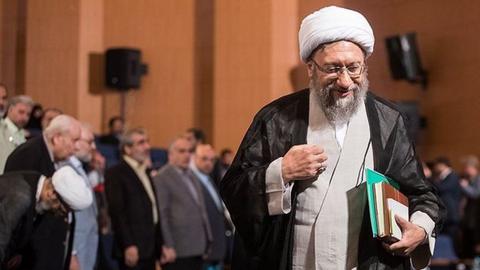On Sunday, July 7, Iran announced plans to boost its uranium enrichment level to 5 percent, exceeding the agreed limit of 3.67 percent set out in the 2015 nuclear deal, officially known as the Joint Comprehensive Plan of Action (JCPOA). The decision comes exactly two months after the Islamic Republic urged the countries still signed up to the deal to take action to solve the financial problems caused by US sanctions on Iranian oil exports, including difficulties with banking transactions.
The Islamic Republic took its first step to upend the deal on May 8, exactly one year after President Donald Trump announced that the United States was withdrawing from the nuclear agreement with Iran. Iran announced that it planned to break the ceiling of 300kg of 3.67 percent enriched uranium that the JCPOA allowed Iran to stockpile.
“In a few hours the technical process will come to an end and the enrichment beyond 3.67 percent will begin,” said Behrouz Kamalvandi, spokesman for Iran’s Atomic Energy Organization. “We are fully prepared to enrich uranium at any level and for any amount.” And Abbas Araghchi, deputy foreign minister for political affairs, announced that if the JCPOA signatories could not solve the problems arising from sanctions in the coming weeks, the Islamic Republic would make its next move and bring the Arak plutonium reactor, which was disabled after the JCPOA came into effect, back online. The reactor can be used to build nuclear bombs, even though the Islamic Republic has repeatedly claimed that it has no intention of building such weapons.
Has Iran Abandoned the Nuclear Agreement?
Keeping uranium at a low enrichment level was one of the key goals of the JCPOA. The higher the enrichment level, the closer Iran will be to building nuclear weapons. Now that Iran has announced its decision to exceed the 3.67 enrichment level and raise it to 5 percent, it has breached one of its fundamental commitments under the JCPOA. And yet, it has not violated all its commitments. In other words, Iran has not completely withdrawn from the nuclear agreement.
What can 5 Percent Enriched Uranium be Used for?
Five percent enriched uranium can be used as fuel for Bushehr nuclear power plant, located near the Persian Gulf. Currently, Russia sells fuel to Iran for Bushehr power plant under an agreement that is still in effect for the moment. But if the 5 percent enriched uranium that Iran intends to produce is of the required quality to fuel a nuclear power plant, then it could replace the fuel currently purchased from Russia.
According to the JCPOA, Iran was allowed to exceed the 3.67 limit eight years after the agreement went to effect but today’s announcement confirms that Iran has put an end to this commitment much sooner.
What are the Consequences of the Announcement?
International Atomic Energy Agency (IAEA) officials inspect Iran’s nuclear activities on a daily basis, and they will inform the IAEA when Iran exceeds the enrichment level set by the JCPOA. Then Yukiya Amano, the IAEA’s director-general, must report the development to the 35 members of the International Atomic Energy Agency, which includes the United States, a permanent member of the agency, or to its 22-member board of governors. The IAEA’s board of governors meets regularly once every four months but, in an emergency, it can meet sooner than scheduled.
How can the US, which has left the JCPOA, call for an IAEA emergency meeting?
According to the IAEA’s bylaws, the director-general or any member of its board of governors can request an emergency meeting. As a member of this board, the United States can request and call for an emergency meeting. The fact that the US government has withdrawn from the JCPOA does not affect this provision.
How Will the UN Security Council React?
The director-general of the IAEA is required to regularly report to the members of the UN Security Council about Iran’s activities with regard to the JCPOA. If and when Amano reports to the members of the Security Council that Iran has actually exceeded the agreed-upon level of enrichment, then the Security Council might decide to review the issue on an emergency basis — and demand immediate action.
Apart from the IAEA’s director-general, any signatory to the JCPOA — the United Kingdom, France, China, Russia and Germany — can decide that Iran has breached the agreement and call for their foreign ministers to address the issue in an emergency meeting. This meeting must take place within 30 days.
If the issue is not resolved, it will be referred to a board of arbitration. This board’s rulings are not binding, and if disagreements between Iran and other remaining parties are not resolved through arbitration or otherwise, the matter will then be referred to the UN Security Council.
The rotating president of the Security Council must then place the issue on the council’s agenda within 30 days. Members then vote whether international sanctions against Iran will remain suspended or not. To ensure the sanctions remain lifted, all Security Council members must vote in favor of the policy; otherwise, nuclear-related sanctions will be reinstated. But, if the Security Council’s rotating president fails to put the issue on the council’s agenda within 30 days, then the Security Council’s sanctions against Iran will automatically resume.
What if the Security Council Reinstates Sanctions?
The resumption of Security Council sanctions also means European Union sanctions against Iran will be reinstated, as will the sanctions other countries, including Canada and Australia, levied on Iran in retaliation for its nuclear program. The resumption of Security Council sanctions will give legitimacy to the resumption of these international sanctions. Prior to the nuclear deal, the Security Council had already passed five resolutions that imposed heavy economic and military sanctions on Iran.
These resolutions even provided for possible military action to prevent Iran from continuing its uranium enrichment and missile development programs. With the ushering in of the JCPOA, these resolutions and sanctions were put on hold. At the same time, the agreement also stipulated that if the deal was violated, these resolutions and sanctions can be reinstated.
Why is Iran Doing This?
Iranian officials claim that the decisions to increase the country’s stockpile of enriched uranium and boost the enrichment level does not mean it is trying to scrap the JCPOA. Instead, they say they want JCPOA member countries to carry out their commitments under the agreement so that Iran can benefit from the lifting of international sanctions. Nevertheless, if Iran continues to dismantle the JCPOA step by step, tensions and disagreements between the various countries, groups, and institutions involved will continue to mount — and it is likely that the full raft of Security Council and European Union sanctions will be reinstated.
Related Coverage:
Sanctions Against Zarif: How Far Will They Go?, June 27, 2019
Sanctions on Ayatollah Khamenei are Much More Than Symbolic, June 25, 2019
Guards Fear Internal Turmoil as Much as US Attack, June 21, 2019
Does Iran Really Want to Negotiate with the US?, June 21, 2019
Decoding Iran’s Politics: The JCPOA Ultimatum, May 16, 2019
Iran's Partial Withdrawal from the Nuclear Agreement: What are the Consequences?, May 8, 2019
Decline in Investment Across Iran After US Exit from the Nuclear Deal, April 27, 2019
How did Countries Deal with Iran During Previous Sanctions?, August 7, 2018
Decoding Iran’s Politics: The 12-Point US Ultimatum, July 6, 2018
Can Iran Legally Close the Strait of Hormuz?, July 5, 2018
Khamenei Calls for Immediate Action on Nuclear Enrichment, June 6, 2018
The Nuclear Deal: Will Khamenei Get What he Wants?, May 29, 2018
visit the accountability section
In this section of Iran Wire, you can contact the officials and launch your campaign for various problems

























comments